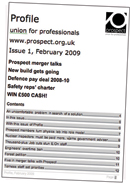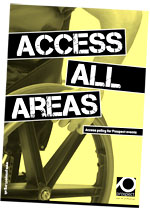Accessibility: Prospect's website, publications and events
We try to make sure that we provide our publications in the formats that members need.

Prospect's website
Our site has been designed with accessibility in mind. We use responsive design with cascading style sheets, and users can override the style sheets by changing their browser preferences. All our text is scaleable, so users can increase or decrease the size by using their browser's 'view' options. Please email the website team if you have any accessibility problems with the site.
Printed publications
Profile magazine is routinely published on audio CD and in large print format. If you'd like one of these formats, log into your welcome page, either select the 'Mailing preferences' link or Edit profile settings' and choose the format you want; or just email our membership department.
We produce our other national publications in accessible formats on request - please contact [email protected].
Access policy for Prospect events
Prospect organises a number of conferences, seminars, training courses and other events both at national, regional and branch level. We have both a moral and legal obligation under the Disability Discrimination Act to ensure that we deliver our services to disabled members in a way that does not discriminate against them.
 Organisations are required to make "reasonable adjustments" to ensure that their buildings and services are accessible and sometimes it may be prohibitively expensive to provide everything requested. The test of "reasonableness" can only be settled by case law, so if you are in doubt always seek advice from the appropriate full-time officer.
Organisations are required to make "reasonable adjustments" to ensure that their buildings and services are accessible and sometimes it may be prohibitively expensive to provide everything requested. The test of "reasonableness" can only be settled by case law, so if you are in doubt always seek advice from the appropriate full-time officer.
Prospect aims to do all it can to ensure its events are accessible for disabled participants. This policy provides a checklist of issues for Prospect staff and branches to bear in mind when organising their events.
In line with Prospect's policy to progress disability equality, we have produced an access policy which aims to ensure that events are accessible for disabled participants. The policy provides a checklist of issues for Prospect staff and branches to bear in mind when organising events.
You can download the policy as a leaflet, or read it on screen below.
Access all areas
Prior to the event
- Ensure that calling notices for the event are available in accessible formats, eg large print.
- On the calling notice for the event always ensure that you ask whether participants need any reasonable adjustments, eg large print documentation, sign language interpretation. The standard question used on forms should be:
Do you regard yourself as a person with a disability? Yes/No
If yes, please state your access requirements or any reasonable adjustments we can make in order that we can meet your access needs. - The calling notice should also include a sentence along the lines of: "All access needs will be met where reasonably practicable."
- Consider including a deadline for access requirements in order to give yourself sufficient time to organise the needs. For example, sign language interpreters may need several weeks notice, or it may take some time converting text to Braille if that is the requirement.
- Ensure that you include support workers, sign language interpreters etc in your catering arrangements.
- When notifying participants of their place on the event, ensure that you include accessibility information for the venue.
- If using speakers, ensure that their presentations are accessible (eg not speaking too fast for sign language interpreters, or simple, uncluttered PowerPoint slides). Remember that you may need to get accessible versions of presentations beforehand.
- If using name badges for the event, ensure that they use large font and are clear.
Transport
- Include advice to participants on public transport to the venue, including accessible trains/tubes/buses and taxis.
- If disabled participants drive to the venue, ensure that there are reserved car parking spaces either at or very near the venue.
- Ensure that pathways and walkways to the venue have level access or ramps.
The venue
- If possible, it is good practice to check out venues yourself rather than rely on general assurances.
- Check whether doorways are wide enough for wheelchair users and that doors are not too heavy to open.
- Check whether the reception area is accessible: is the reception desk at an appropriate height for wheelchair users; is the signage clear; if there are mats near the doorway are they flush with the floor; is there someone available to help/guide disabled participants?
- Where possible, only use meeting facilities on the ground floor. If this is not possible, ensure that there are accessible lifts for wheelchair users and those with visual impairments, eg the width of the doors and the lift itself, height of controls, sound and visual information, embossed control buttons.
- Ensure there are adequate accessible toilet facilities.
- Ensure that there is level or ramped access to the venue itself and to meeting rooms, rooms where refreshments are provided and accessible toilet facilities.
- Check whether handrails are provided on ramps and stairs. Where there are stairs, steps and glass doors check that they are adequately marked to assist those with visual impairments.
- Consider the seating arrangements of the conference/meeting room, eg sufficient space to allow for free and safe movement; a clear line of sight for those who use sign language interpreters; space for wheelchairs or personal assistants.
- Check whether there are induction loops in all the rooms you will be using, and that they are working. If the venue does not have induction loops, you can hire portable ones.
- Check whether there are steps/ramps to lecterns and are they at suitable heights, are the microphones accessible?
- If more than one meeting room is being used at the venue, ensure that they are reasonably close together so that those with mobility impairments can easily access them.
- Ensure that the venue and meeting rooms have appropriate lighting for those with visual impairments.
- Ensure that there are regular breaks scheduled in the event.
- Check whether participants may need assistance with refreshments, eg seating arrangements. If it is self-service those with mobility impairments may need assistance with carrying, and if so will there be any staff available to help?
- Check whether the catering arrangements are suitable for particular dietary requirements.
- If a participant has a guide or hearing dog, ensure that there are suitable refreshments for the dog.
- Ensure that the venue's emergency procedures take account of disabled people (visual and audible fire alarms for example). Also ensure that the event's organiser and chair are aware of emergency and evacuation procedures and that this is communicated to participants at the start of the event.
- Ensure that those running the event, as well as staff at the venue itself, are aware of participants' needs.
Residential accommodation
- Does the hotel or venue have enough accessible rooms?
- Are room controls and furniture set at appropriate heights?
- Are the bathroom facilities adequate for your participants' needs?
- Check that the room and bathroom are equipped with alarms.
- Check whether there are textphone facilities available in the rooms.
- Check that the hotel can accommodate guide dogs.
Guidance on building design
Copies of BS8300 "Designing Buildings and their approaches to meet the access needs of disabled people" can be obtained from the British Standards Institute: http://www.bsigroup.com/en-GB/ Tel: 020 8996 9000
